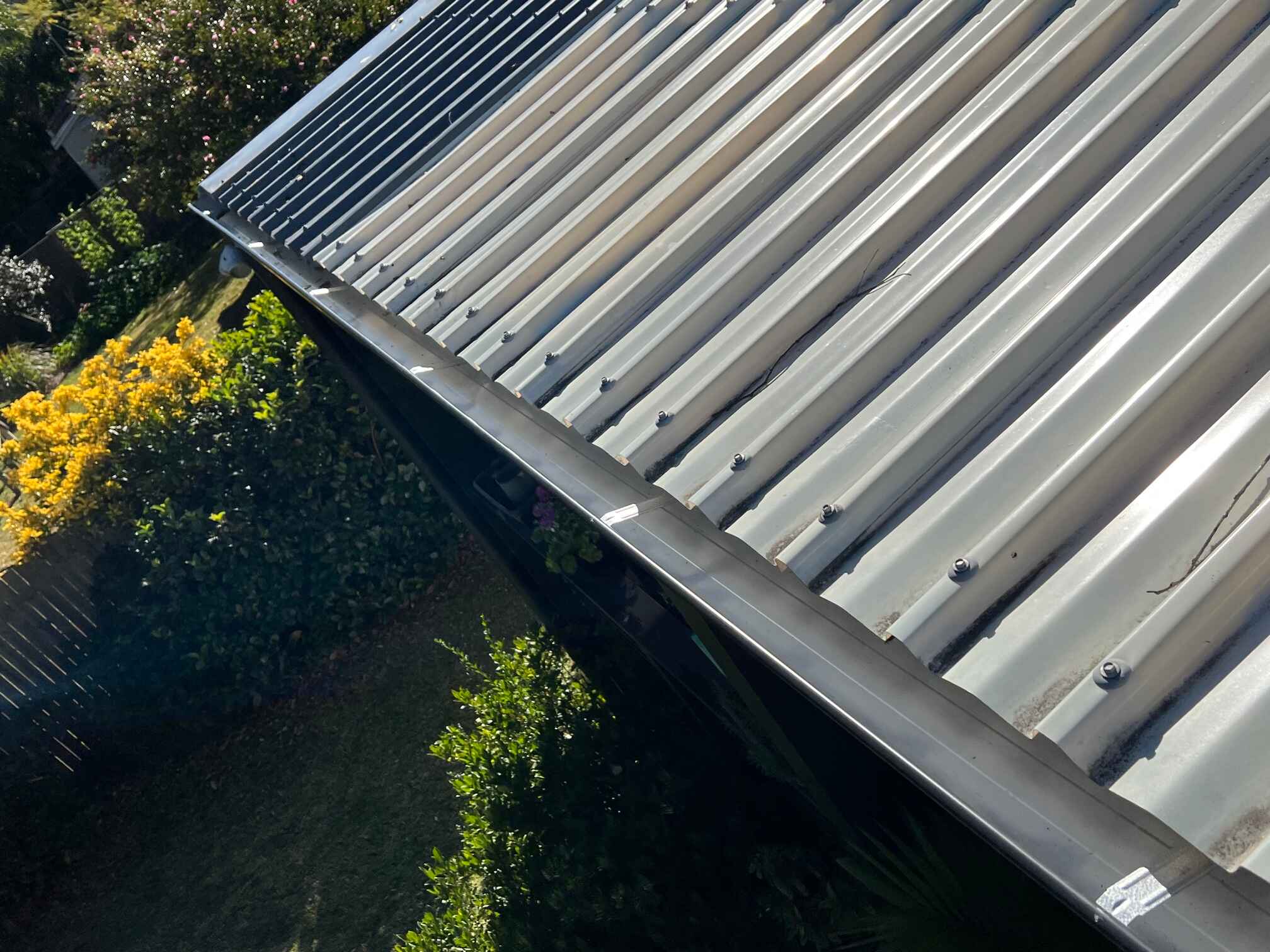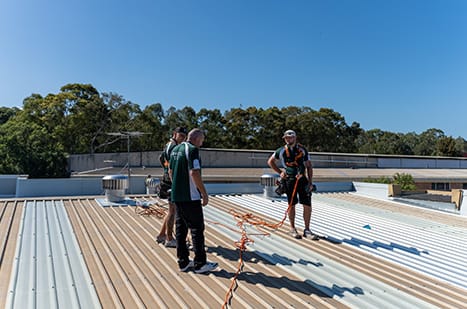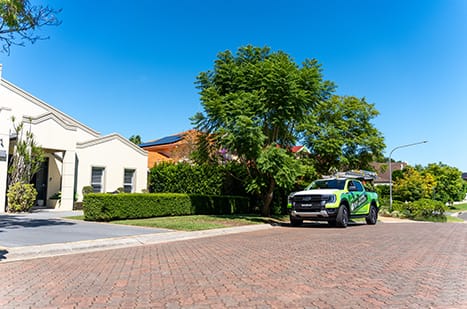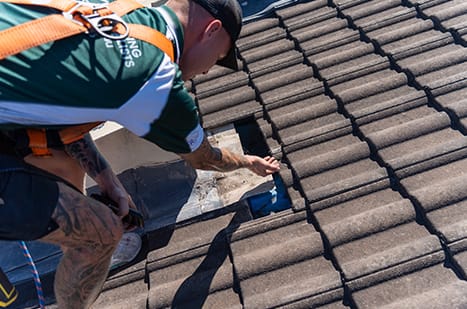Sydney has experienced severe weather events causing millions in damage, including the January 2025 storms that generated 2,000 emergency calls and $80 million in damages. With NSW SES responding to over 29,000 storm incidents last season, spending a weekend preparing your roof now could save you thousands in repair costs and insurance headaches later.
Sydney’s storm season is approaching, and homeowners across the city need to take action before the next big weather event hits. This comprehensive pre-storm roof checklist gives you a practical, step by step guide to protect your property investment, plus everything you need to know about NSW roofing regulations and when to call a licensed professional.
Safety First: When Not to DIY
Never climb onto your roof unless you’re trained and equipped for the job. Falls from roofs are a leading cause of serious injury in Australia. For any inspection that requires getting on the roof, or if you spot potential issues, book a licensed roofer from Ivy Roofing for emergency repairs. Your safety is worth more than any repair bill.
The Complete 12 Point Pre-Storm Roof Checklist
1. Ground Level Visual Scan (15-20 minutes — DIY)
Start with a thorough visual inspection from ground level using binoculars if needed. Look for missing or damaged tiles, sagging gutters, loose flashings, and debris buildup in roof valleys. Pay special attention to areas where different roof planes meet, as these are common weak spots during storms.
What to do: Take photos of any issues you spot. Missing tiles should be replaced immediately as they create entry points for water during heavy rainfall. If you’re not confident to visually check your roof yourself, Ivy Roofing can help with general roof inspections to ensure your roof is in top condition.
2. Gutter and Downpipe Assessment (30-45 minutes — DIY/Pro for difficult access)
NSW SES specifically recommends cleaning gutters, downpipes and drains to prevent blockages as a key storm preparation step. Blocked gutters cause water to overflow and potentially enter your home through the roof cavity or eaves.
What to do: Clear leaves, debris, and any bird nests. Test water flow by running a garden hose into the gutters. If water pools or overflows, you may have a blockage in the downpipes that requires professional attention. Did you know that Ivy Roofing offers scheduled roof and gutter cleaning for residential properties to ensure your gutters are as clean and clear as possible.
3. Ridge Capping and Flashings Inspection (Call Ivy Roofing)
Ridge capping and flashings are your roof’s first line of defence against water entry. Loose mortar pointing, cracked ridge tiles, or rusted metal flashings become major leak points during Sydney’s heavy rainfall events.
What to do: If you notice any loose or damaged ridge capping or if metal flashings show signs of rust or lifting, this requires immediate professional attention.
4. Tile and Roof Sheet Condition Check (Call Ivy Roofing)
Individual tiles or corrugated sheets that are cracked, loose, or displaced can quickly lead to water entry and more extensive damage during storms.
What to do: Any loose tiles should be re-secured, and cracked ones replaced before storm season. This work requires proper safety equipment and roofing expertise.
5. Roof Penetrations Sealing Review (Call Ivy Roofing)
Vents, skylights, plumbing stacks, and antenna mounting points are common leak sources. The seals and flashings around these penetrations deteriorate over time and need regular maintenance.
What to do: Professional inspection is recommended as these areas require specific weatherproofing knowledge and may need resealing with appropriate materials.
6. Sarking and Underlay Assessment (Call Ivy Roofing)
If you’ve had recent roofing work or suspect leaks, the sarking and underlay beneath your roof tiles or sheets may need inspection. These materials provide crucial secondary protection during extreme weather.
What to do: This requires internal roof space inspection and should only be done by professionals who can safely access and assess these areas.
7. Tree and Branch Management (30-60 minutes — DIY/Arborist for large trees)
Trim trees and branches that could potentially fall on your home or property is specifically recommended by NSW SES for storm preparation. Overhanging branches not only pose impact risks but also deposit debris that blocks gutters.
What to do: Trim small branches yourself if you can do so safely. For large trees or branches near power lines, hire a qualified arborist.
8. Gutter Condition and Support Assessment (Call Ivy Roofing)
Old or corroded gutters may not handle Sydney’s intense rainfall loads. Sagging gutters indicate failing brackets that could lead to complete gutter failure during storms.
What to do: If gutters show signs of corrosion, sagging, or loose brackets, professional replacement or repair is needed before storm season.
9. Internal Inspection for Early Warning Signs (10-15 minutes — DIY)
Check your ceiling and internal walls for water stains, mould growth, or moisture damage behind eaves. These signs often indicate existing roof problems that will worsen during storms.
What to do: Document any stains or mould with photos. Even small stains can indicate significant roof issues that need professional assessment.
10. Roof Pitch and Drainage Assessment (Call Ivy Roofing)
Flat or low pitched roof areas need special attention to ensure water drains properly. Blocked overflow outlets or scuppers can lead to ponding water and potential structural damage.
What to do: Professional assessment is recommended for flat roof areas, as proper drainage is critical and may require specialised knowledge.
11. Metal Roof Fastener Inspection (Call Ivy Roofing)
On metal roofs, corroded screws and loose fastenings are common failure points during high winds. These need to be identified and replaced with appropriate fasteners.
What to do: This requires roof access and knowledge of proper fastener types and installation, so professional service is recommended.
12. Documentation for Insurance (15-20 minutes — DIY)
Take dated photos of your roof’s current condition from multiple angles. This documentation can be valuable for insurance claims if storm damage occurs.
What to do: Store photos in cloud storage with clear dates. Take additional photos immediately after any storm events for comparison. Ivy Roofing will also be able to help with documenting any roofing issues and provide proof for insurance once your roof is compliant.
Sydney Roof Regulations and Licensed Contractor Requirements
When You Must Use a Licensed Roofer
In NSW, you must have a contractor licence to carry out, advertise or contract for building or trade work that is valued at more than $5,000 in labour and materials (including GST). This applies to most roofing repairs and replacements in Sydney’s current market.
Key Requirements:
- Check licenses on NSW Fair Trading before hiring any contractor
- Get written quotes and use appropriate Fair Trading contract templates for works over $5,000
- Ensure your contractor has current public liability insurance
- Verify Home Building Compensation Scheme coverage is in place before work begins
Building Codes and Standards
Roofing work must comply with the National Construction Code (NCC) and relevant Australian Standards, including AS 1562.1 for metal roof cladding. These standards include specific wind rating design requirements that are particularly important in Sydney’s coastal environment.
Sydney falls within specific wind regions that determine the structural requirements for roofing systems, and professional roofers must design and install systems accordingly.
Council Approval Requirements
Some reroofing or structural roof changes may require council approval or certification. Each Sydney council has different requirements, so it’s important to check with your local council or consult a certifier like Ivy Roofing before beginning major roofing work.
Why Choose Ivy Roofing for Your Residential Needs
Local Sydney Specialists with Proven Results
Ivy Roofing brings over 20 years of experience serving Sydney homeowners, with more than 30,000 satisfied customers across the metropolitan area. As residential roofing specialists, we understand Sydney’s unique weather challenges and building requirements.
Comprehensive Services:
- Pre-storm roof inspections and maintenance
- Emergency 24/7 leak response
- Tile and metal roof repairs and replacement
- Licensed and compliant crews with full insurance coverage
- Service coverage across North Shore, Hills District, Inner West, and Western Sydney
Why Choose Us:
- Fully licensed NSW contractors
- Comprehensive public liability insurance
- Written warranties on all work
- Before and after photo documentation
- Established customer testimonial record
Take Action Before the Next Storm
Don’t wait for the next severe weather warning to protect your home. Book a free pre-storm roof inspection with Ivy Roofing today. We offer:
- Urgent Emergency Response: 24/7 availability for storm damage
- Standard Pre-Storm Inspections: Comprehensive assessment and written report
- Maintenance Plans: Ongoing protection for your roof investment
Call us now or visit our website to schedule your inspection and get peace of mind before storm season arrives.
Frequently Asked Questions
Do I need council approval to re-roof my home? It depends on your local council and the scope of work. Structural changes or complete re-roofing may require approval. Contact your local Sydney council or Ivy Roofing for specific guidance.
When should I replace rather than repair my roof? If repairs would cost more than 50% of replacement value, or if your roof is approaching 20-25 years old with multiple issues, replacement is often more cost effective. A professional assessment can help you make this decision.
Will my insurer require maintenance records? Many insurance policies require reasonable maintenance to maintain coverage. Keeping records of inspections and repairs can help support any future claims and may even reduce your premiums.
How often should I have my roof professionally inspected? Annual inspections are recommended, with additional checks after severe weather events. Pre-storm inspections give you time to address issues before they become expensive emergency repairs.
This article provides general guidance only. For specific roofing advice and professional inspections, contact Ivy Roofing’s licensed specialists. Always prioritise safety and use qualified professionals for roof work.




